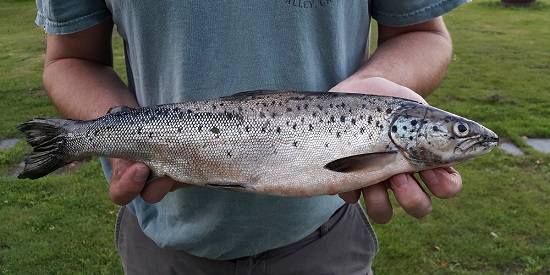Warrnambool scientist helps tackle climate change impact on fish
Media release
Scientists are closer to tackling the impact of increased water temperature and long-term thermal stress on fish, thanks to genetic research from a Deakin Warrnambool PhD graduate.
School of Life and Environmental Sciences PhD researcher Jared Tromp used his research project to investigate the genetic response of juvenile Atlantic salmon to long-term thermal stress, identifying genes within the fish that were affected by rising water temperatures.
Mr Tromp received his doctoral degree at yesterday's Deakin Warrnambool graduation ceremony.
He said his work showed that increased water temperature caused fish to express different genes, including ones associated with growth performance and health.
Mr Tromp said his PhD project laid the groundwork for future studies of fish health, and could potentially be used to assist in producing salmon that are more resistant to rising ocean temperatures.
"The genes identified in my work can be used to understand the mechanisms underlying growth and fish health during periods of long-term thermal stress," he said.
"These genes may also be used in breeding programs to improve thermal resistance in Atlantic salmon populations. More broadly, these genes can be used by the scientific community to investigate long-term thermal stress in different fish species."
Originally from the north-east Melbourne suburb of Mount Evelyn, Mr Tromp moved to Warrnambool in 2010 to complete a Bachelor of Environmental Science majoring in Marine Biology, and has stayed in the region ever since.
"I thoroughly enjoyed my time with Deakin and all the opportunities that were provided at the Warrnambool campus and the surrounding aquatic environment," he said.
"Studying at Warrnambool provided access to state-of-the-art aquaculture facilities that wouldn't have been available at other campuses or universities. Warrnambool also has a relatively small campus, which allows for a better access to laboratory equipment and fosters a uniquely close community between peers and academics."
Now that he has finished studying, Mr Tromp plans to continue his work in the region as an environmental scientist. He has also accepted a role with South West TAFE working with information and communication technologies.
Deakin Warrnambool Campus Director Alistair McCosh congratulated Mr Tromp and the rest of the Warrnambool graduating cohort on reaching the next stage of their education journey.
"At Deakin we aspire to prepare our graduates for the future – whether they've embarked on their first degree, are advancing in their field, are moving into a new field or further research, or are looking to start their own companies and create further employment for others," Mr McCosh said.
"We strive for our graduates to realise their full potential and contribute to making their part of the world a better place, and that's why, for the past eight years, Deakin University has ranked first in Victoria for graduate satisfaction.
"I'm looking forward to seeing how this latest round of extraordinary graduates will take the knowledge and skills they've gained during their time at Deakin, and how they will use this experience to benefit themselves and the community we serve."
The Deakin Warrnambool graduation ceremony was held 12pm Thursday 28 February 2019 at Lighthouse Theatre, 185 Timor St, Warrnambool.
Students from each of the University's four faculties – Arts and Education; Business and Law; Health; and Science, Engineering and Built Environment – were presented with their degrees following an Occasional Address delivered by former Victorian Premier the Hon Dr Denis Napthine, and a Mayoral Address from Warrnambool City Council Mayor Tony Herbert.

